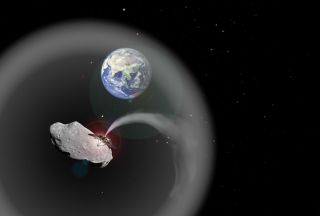
A recent study featured in the journal Science, conducted by an international team of climate experts and paleo-biologists from South Korea and Italy, has revealed a captivating narrative linking early human interbreeding to past changes in atmospheric CO2 levels and corresponding shifts in climate and vegetation. This innovative approach sheds light on the intriguing interactions between different hominin species, such as Neanderthals and Denisovans, and the influence of climatic conditions on their interbreeding patterns.

As Earth's temperature continues to rise at an alarming rate, scientists are tirelessly exploring innovative strategies to mitigate the impacts of climate change. Among these approaches, a groundbreaking concept put forth by astronomer István Szapudi from the University of Hawaiʻi Institute for Astronomy proposes a solar shield combined with a tethered asteroid as a potential game-changer. Published in the Proceedings of the National Academy of Sciences, his paper, "Solar radiation management with a tethered sun shield," outlines a visionary plan that could potentially revolutionize climate change mitigation efforts.

The devastating wildfires have been raging in Hawaii, particularly on the island of Maui. Climate change is playing a role in these wildfires, as it is making the conditions more conducive to fire. climate change is causing the state to experience more frequent and intense droughts, which dries out vegetation and makes it more flammable. In addition, climate change is causing the state to experience more extreme weather events, such as hurricanes, which can also contribute to wildfires.

This summer, Asia has been impacted by the scorching heat waves as the temperatures reached record-breaking highs. The article cites scientists who say that the heat wave is a sign of the growing impacts of climate change.

The recent two-day summit in Belém, Brazil, involving the eight countries that share the Amazon basin, has fallen short of its goal to combat deforestation, according to climate activists. While a joint declaration was issued to address deforestation, the agreement lacked concrete measures, prompting criticism from climate advocates who assert that the urgency of the climate crisis demands stronger action.

The recent devastating wildfires in Maui, Hawaii, which swiftly consumed vast areas, have raised concerns about their underlying causes. Erica Fleishman, Director of the Oregon Climate Change Research Institute at Oregon State University, emphasizes the unsettling similarity between these wildfires and the landscape-altering blazes often observed in the Western United States. She notes that as the global climate crisis unfolds, regions unaccustomed to wildfires may experience an increase in their frequency, scale, and speed.

As Earth Overshoot Day for 2023 passed on August 2nd, the intricacies of pinpointing the exact date when humanity exceeds the planet's regenerative capacity remain a challenge due to scientific and methodological complexities.

Coca-Cola, the US-based beverage giant, finds itself in the spotlight yet again for its substantial contribution to global pollution, coinciding with delays in the UK's efforts to hold corporations accountable for their environmental impact. The Surfers Against Sewage Brand Audit Report has revealed that Coca-Cola is responsible for nearly 20% of all branded pollution collected during organized clean-up efforts in the UK over the past year. This disheartening statistic persists despite the company's newly launched environmental initiatives aimed at addressing its ecological footprint.

Amidst mounting concerns about environmental impact, the personal care industry stands at a crossroads, facing the challenge of aligning its practices with climate-positive action. As the imminent bans on wet wipes and the surge of fatbergs choking city sewers underscore the urgency of change, Jeremy Freedman, the Managing Director of sustainable personal care manufacturer Guardpack, asserts that the industry can and must embrace sustainability to lead the way for broader change.

Recent data reveals that despite the implementation of policies and guidelines, a significant number of employers are falling short in promoting environmentally conscious travel decisions among their workforce. The blame for the lack of transition to more sustainable travel options is being directed towards organizations, as employees believe that their employers hold the responsibility to facilitate and ensure eco-friendly travel choices, irrespective of potential costs.